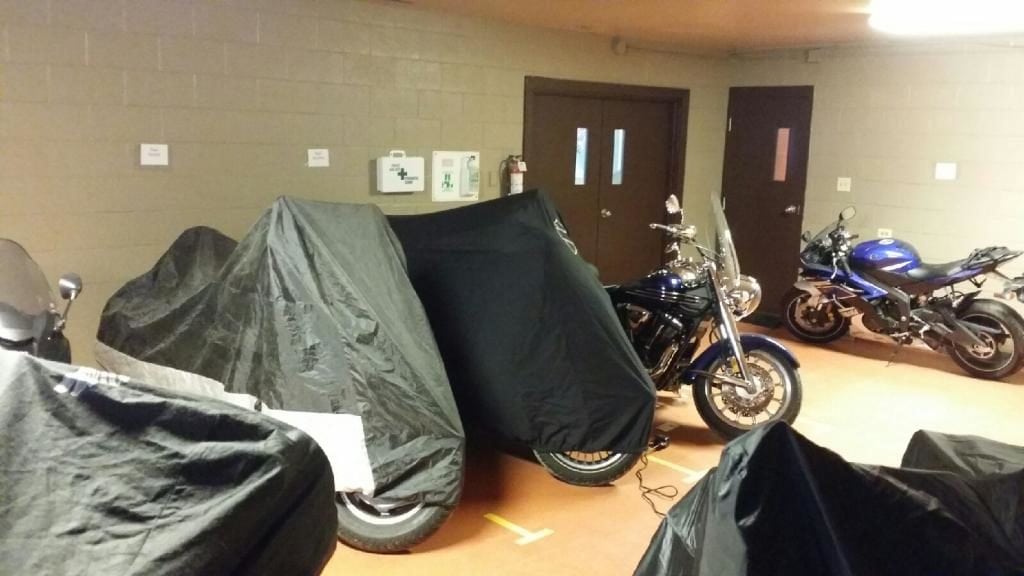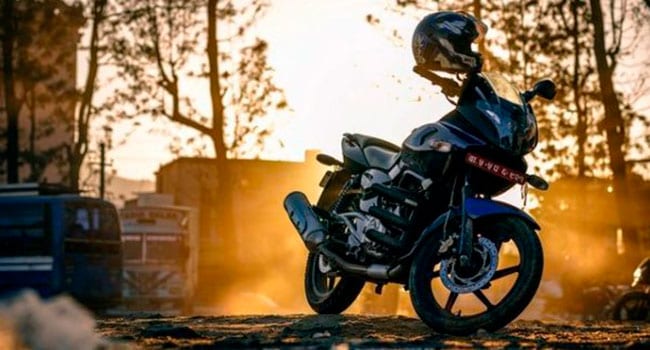
There are several steps you need to take to prepare your motorcycle for winter storage. If you have a good quality, breathable cover, put it on – carefully. Unless the bike is being left outside, anything non-synthetic will do – even a heavy blanket is better than nothing. And don’t scratch the paint.
 The sun is shining and the weather has never been lovelier (in my part of the country). Nonetheless, it’s time to start thinking about storing your bike for the winter. And by that I don’t mean putting it up on the kick stand, stashing it in a corner of the garage and just forgetting about it for six months.
The sun is shining and the weather has never been lovelier (in my part of the country). Nonetheless, it’s time to start thinking about storing your bike for the winter. And by that I don’t mean putting it up on the kick stand, stashing it in a corner of the garage and just forgetting about it for six months.
Here are some things you should do to keep it safe, sound and ready for next spring:
• First up, warm the bike up and change your oil(s). By installing fresh oil, most contaminants are removed and if the oil is hot, it’ll drain more thoroughly. Filling the oil all the way up to the filler hole is also a good idea, because it’ll cover transmission components, eliminating the possibility of rust formation. Some models – Harley-Davidson, for example – have different types of oil for the engine and transmission. Get this sorted out before you start.
• Find some decent storage. If you don’t have a basement or a weather-tight garage, think about renting space at a mini-storage facility or storing it with your local dealer. If it can be avoided, don’t park the vehicle near any caustic materials – i.e. swimming pool supplies – or working electric motors.
• Fill the gas tank to the top and add some fuel stabilizer. This will prevent any moisture from forming and preserve the fuel’s quality. Run the bike briefly to get the stabilizer distributed throughout the system. This is especially crucial for bikes with carburetors. Be sure to use a recommended fuel stabilizer as indicated in the owner’s manual.
• Some riders like to squirt oil into the cylinders so they won’t ‘scuff’ when the bike is started up again in the spring. That might be a little over the top unless you plan on putting the bike up for a year or two, but it won’t hurt it either.
• It’s not a bad idea to put the bike on a low-output trickle charger over the winter. Failing that, take the battery out of the bike and store it in a warm, dry place. If the battery is over five years old, discard it and buy a new one in the spring. Don’t cheap out here, it’s money well spent. If you don’t have a trickle charger, giving the battery a recharge every couple of weeks will do the job. Remember: batteries self-discharge at a faster rate at lower ambient temperatures.
• For liquid-cooled bikes, drain the coolant and refill it with fresh stuff. And when you dispose of it, do not pour it down the nearest storm drain – take it to an approved drop-off facility.
• If you have a centre stand and plan on storing the bike for six months or more, get the tires off the ground to prevent flat spots. If you don’t have a stand, you can usually buy a motorcycle lift for less than $150; Canadian Tire sells them for $100 to $200. Failing that, jack it up and put some blocks under the frame. Be careful when you do this and don’t break anything or squash any important lines. Ensure your tires are at the correct pressure.
• It doesn’t hurt to give the bike a final wash and wax before you lock it away, to get rid of any road grime or crud you may have accumulated during the summer. Ensure the motorcycle is clean and any bare metal surfaces are protected with the appropriate surface care products. Spraying WD-40 on nuts and bolts is not a bad idea.
• If you have a good quality, breathable cover, put it on – carefully. Unless the bike is being left outside, anything non-synthetic will do – even a heavy blanket is better than nothing. And don’t scratch the paint.
• Last but not least, do not be tempted to fire the bike up mid-winter unless you plan on taking it for a decent run. Just idling the bike for 10 or 15 minutes does more harm than good.
Happy trails.
Ted Laturnus writes for Troy Media’s Driver Seat associate website. An automotive journalist since 1976, he has been named Canadian Automotive Journalist of the Year twice and is past-president of the Automotive Journalists Association of Canada (AJAC).
The views, opinions and positions expressed by columnists and contributors are the author’s alone. They do not inherently or expressly reflect the views, opinions and/or positions of our publication.


